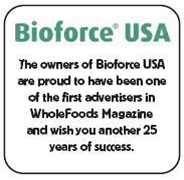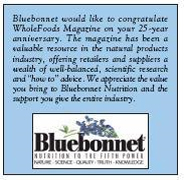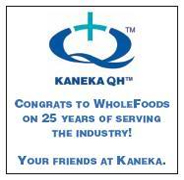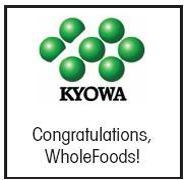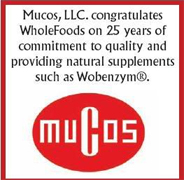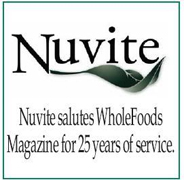By all rights, this issue of WholeFoods should not exist. Just a few years after printing its first issue in 1977, the publication was struggling to keep its head above water. Holding the position of dead last among competitor magazines, the management team at the time seriously considered calling it quits. This may have been the end of the WholeFoods story—had it not been for Howard Wainer.
Howie purchased the magazine in February 1984, took over the reigns as publisher of WholeFoods and made the precarious move to open a publishing company to produce this magazine and others. Within a few issues, the magazine re-established its footing and broke ground with coverage of the natural products industry that was unique, thorough and insightful. It only took a few issues under the management of the Wainer family before WholeFoods became a top publication in its field (and still is today).
So, how did Howie manage to revive WholeFoods to the point where it is today? Well, he answered that very question in March 1989 as he reflected on the company’s fifth anniversary: “This turnaround was the result of my dream and the WholeFoods philosophy.” The philosophy, he explained, was to inform and educate natural products retailers with timely and important information about the products they sell. After all, Howie said, “An educated retailer is better equipped to help the consumer.” He firmly believed in the importance of the natural products industry and the value of a strong industry publication to serve its needs for good, reliable information.
Twenty-five years (and more than 300 issues) later, this philosophy remains the same, although the faces that have brought you your monthly issue have changed over the years. But without fail, Howie’s core WholeFoods philosophy and values drive the WholeFoods team each and every day to put out the best product we can for our readers.
Now, walk with us through the pages of WholeFoods’ history as we revisit some of the most formative moments in our industry’s history over the past five years.
—The Editors

2004
 Ephedra Dies. Marking the first time a dietary supplement was removed from the market since the passage of the Dietary Supplement Health and Education Act of 1994 (DSHEA), the U.S. Food and Drug Administration (FDA) issued a ban on products with ephedrine alkaloid. The agency’s reason was that 16,000 adverse events were reported by those using ephedra supplements and 100 deaths were caused by the substance. Reactions from the industry were mixed, though one of the initial fears was that it would not be the last such ban and, ultimately, would place DSHEA in danger. To help cut off any problems, the Coalition to Preserve DSHEA was formed. Then in May 2004, Nutraceutical Corporation and Solaray, Inc. filed a complaint in a Utah District Court challenging the FDA’s ban of ephedra.
Ephedra Dies. Marking the first time a dietary supplement was removed from the market since the passage of the Dietary Supplement Health and Education Act of 1994 (DSHEA), the U.S. Food and Drug Administration (FDA) issued a ban on products with ephedrine alkaloid. The agency’s reason was that 16,000 adverse events were reported by those using ephedra supplements and 100 deaths were caused by the substance. Reactions from the industry were mixed, though one of the initial fears was that it would not be the last such ban and, ultimately, would place DSHEA in danger. To help cut off any problems, the Coalition to Preserve DSHEA was formed. Then in May 2004, Nutraceutical Corporation and Solaray, Inc. filed a complaint in a Utah District Court challenging the FDA’s ban of ephedra.
Low-Carb Craze. This year, low-carb offerings popped up everywhere from bun-less Burger King Whoppers to low-carb wraps at Subway. Estimates said that nearly three million Europeans and about 11% of Americans were on a carbohydrate-restrictive diet. The industry responded to the trend with its first major tradeshow dedicated to the low-carb industry (the LowCarbiz Summit) and the creation of the Low Carb Manufacturers Alliance. In spring 2004, the Grocery Manufacturers of America petitioned the FDA to establish guidelines for the labeling of carbohydrates. Unfortunately by mid-2004, the low-carb diet was under fire for causing consumers to make poor food choices and a consumer even filed a lawsuit against Atkins Nutritionals, saying the diet contributed to his heart condition.
WholeFoods captured the twists and turns of this movement in a special section devoted to news and trends associated with low-carb foods.
2005
Feeling Insecure. 2005 was marked with new public health crises that led to an overall feeling of uncertainty about the U.S. government’s ability to protect its people. In one of the worst natural disasters this country has faced, Hurricanes Katrina and Rita devastated the Gulf Coast and left victims waterlogged and without food or shelter. The natural products industry lent a helping hand by donating products and other aid to those affected. If that weren’t enough, fears of a bird flu pandemic and other illnesses caused by bacteria-tainted foods contributed to a feeling of helplessness.
 Organic Rules. After a long fight, organic proponents convinced Congress to pass the Organic Food Production Act in 1990. After 12 years of much back and forth, the rule was adopted on October 21, 2002. In response, organic farmer Arthur Harvey filed a lawsuit to close loopholes in the law and was defeated, but in April 2005, a federal appeals court reopened the case and suggested that parts of the rule may be invalid. At the same time, the American Herbal Products Association tried to get the U.S. Department of Agriculture to allow organic status for herbal supplements, and the Organic Consumers Association fought for the term “organic/organics” to not be allowable on health and beauty care items.
Organic Rules. After a long fight, organic proponents convinced Congress to pass the Organic Food Production Act in 1990. After 12 years of much back and forth, the rule was adopted on October 21, 2002. In response, organic farmer Arthur Harvey filed a lawsuit to close loopholes in the law and was defeated, but in April 2005, a federal appeals court reopened the case and suggested that parts of the rule may be invalid. At the same time, the American Herbal Products Association tried to get the U.S. Department of Agriculture to allow organic status for herbal supplements, and the Organic Consumers Association fought for the term “organic/organics” to not be allowable on health and beauty care items.
Ephedra Saga Continues. In a record decision, a U.S. District Court ruled on April 13, 2005 that FDA’s 2004 ephedra ban was unlawful and exceeded the agency’s authoritative reach. The judge also granted an injunction from Nutraceutical Corporation to let the company again sell ephedra supplements that contain 10 mg or less of the ingredient. Success was not long-lived, however. The following year, the U.S. Court of Appeals reversed this decision and blocked Nutraceutical from selling supplements containing ephedra. And at the end of 2006, Nutraceutical Corporation’s request for a rehearing was turned down; the company answered by filing a petition to move the issue before the Supreme Court.
2006
 Pressure Builds for Regulations. In 2006, industry put added pressure on the government to establish specific regulatory guidelines for the dietary supplements industry. In the first quarter, industry made it clear it wanted some attention from the government by proposing a regulatory model for traditional medicine suggested by the Traditional Medicines Congress (made up of nine industry companies). And then after much prodding, the FDA promised (again!) to unveil its final rule on current good manufacturing practices for dietary supplements in December 2006. It took another year before the document was officially approved.
Pressure Builds for Regulations. In 2006, industry put added pressure on the government to establish specific regulatory guidelines for the dietary supplements industry. In the first quarter, industry made it clear it wanted some attention from the government by proposing a regulatory model for traditional medicine suggested by the Traditional Medicines Congress (made up of nine industry companies). And then after much prodding, the FDA promised (again!) to unveil its final rule on current good manufacturing practices for dietary supplements in December 2006. It took another year before the document was officially approved.
But perhaps the biggest regulatory news of the year was the Adverse Event Bill. On June 21, the Dietary Supplement and Non-Prescription Drug Consumer Protection Act called for serious adverse events of supplements (and OTC drugs) to be reported to FDA. Many in the industry backed the bill as it illustrates a strong commitment to consumers.
Hain Grows and Grows. Fiscal Year 2006 was a time of extensive acquisitions for The Hain Celestial Group. The firm acquired Spectrum Organic Products, Inc. in December; the Queen Helene, Batherapy, Shower Therapy and Footherapy brands in March; a prepared foods business in the United Kingdom in April; and the Linda McCartney brand in June. These acquisitions followed the 2005 takeover of Zia Cosmetics. And at the beginning of the year, the company parted ways with H.J. Heinz Company, which sold its 6,090,351 shares of Hain stock for $20 per share.
2007
Honeybee Colony Collapse. In spring 2007, researchers began to notice a drop-off in the U.S. honeybee population for reasons that no one could explain at the time. Honeybees pollinate a majority of U.S. crops, so many feared that the agricultural sector might be affected. A month later, Cornell University released a statement saying that the population losses may have been triggered by parasitic mites. The U.S. Department of Agriculture responded with a plan to address the problem, but the exact cause and solution are still under investigation.
 GMPs (Finally!). After literally years of waiting, regulations for good manufacturing practices were approved. The reaction from the industry was enthusiastic (if not ecstatic) over the possibility that the rules would help weed out low-quality manufacturers and instill extra confidence in consumers about supplement quality. However, many were skeptical that the agency had the resources to ensure the rules are enforced.
GMPs (Finally!). After literally years of waiting, regulations for good manufacturing practices were approved. The reaction from the industry was enthusiastic (if not ecstatic) over the possibility that the rules would help weed out low-quality manufacturers and instill extra confidence in consumers about supplement quality. However, many were skeptical that the agency had the resources to ensure the rules are enforced.
Food Chain Dilemmas. The year started off with much focus on E. coli prevention, as the United Fresh Produce Association pushed for voluntary changes, while other groups asked FDA to address the problem of foodborne illnesses. FDA responded by stating that food safety was a top priority, setting aside a record-level $1.1 billion of its budget for the Food Safety and Inspection Service. And then, the melamine disaster hit. More than 100 pet foods (including one natural line) were recalled because of melamine contamination, causing deaths in pets. The source was traced to a company in China, which secretly mixed the melamine into rice protein concentrate to give a false appearance of high protein levels. FDA proceeded to inspect a variety of grains for contamination and found none. However, melamine was later found in animal feed stock and in baby formula (in China in 2008). The situation had a three-fold effect: consumer concern about the origin of food/supplement ingredients, skepticism of any ingredients sourced from China, and doubt that the FDA could adequately ensure the safety of the U.S. food supply. The agency noted in August that it needed to be more proactive and focus on prevention, but a few months later, released a plan to close half of its testing laboratories. At the end of the year, FDA dropped this plan.
The Merger that Was, then Wasn’t, then Was, then…In a move that increased its already dominant position, Whole Foods Market announced it was acquiring rival chain Wild Oats Markets for $565 million, with the deal set to close in April. But before it could be set in stone, the Federal Trade Commission (FTC) announced it would file a lawsuit to ban the merger on the grounds that it will create a monopoly. Whole Foods returned the favor, saying it would challenge the lawsuit. Finally in August, the U.S. District Court for the District of Columbia said the merger was a “go,” and finally closed—until it resurfaced in 2008! After reconsidering the situation, the FTC again tried to block the merger, which met much opposition from Whole Foods Market. As of press time, the situation was still unfolding.
2008
 WholeFoods Goes Green. WholeFoods made 2008 a landmark “green year” with the debut of its Green News coverage in January. This section set out to highlight the industry’s efforts in preserving natural resources through alternative energy sources, recycling, environmentally friendly packaging and more. Then in October, the team officially launched the WholeFoods Magazine Greenbook (www.wfcgreenbook.com) with the goal of giving readers a paperless way to read WholeFoods via a password-protected Web site.
WholeFoods Goes Green. WholeFoods made 2008 a landmark “green year” with the debut of its Green News coverage in January. This section set out to highlight the industry’s efforts in preserving natural resources through alternative energy sources, recycling, environmentally friendly packaging and more. Then in October, the team officially launched the WholeFoods Magazine Greenbook (www.wfcgreenbook.com) with the goal of giving readers a paperless way to read WholeFoods via a password-protected Web site.
Stevia Success. 2008 was a sweet year for stevia fans. Wisdom Natural Brands’s stevia received GRAS status in the summer of 2008, marking the first time that stevia was made available as a sweetener and not simply a supplement. In turn, industry saw a flurry of stevia sweetener product launches while two big-name partnerships entered the ring: Cargill/Coca-Cola and Whole Earth Sweetener Company/PepsiCo. Then in mid- to late 2008, the Joint FAO/WHO Expert Committee on Food Additives deemed that the herb was safe for use in food products and in December, FDA said it would not oppose GRAS status for rebaudioside A (rebiana), the leaves of the stevia plant. But stevia’s road to market was not perfectly straight. At the tail end of 2008, a petition submitted to FDA claimed that because the herb had been researched for therapeutic purposes, stevia should be deemed a drug and, therefore, unsuitable for grocery applications. As of press time, the jury is still out on how FDA will react to this petition.
 Economic Woes. By the end of 2008, American citizens were nervous about the economic climate. The country had seen its share of banks in trouble, bankruptcy of major U.S. corporations, credit crunches and high gas prices.
Economic Woes. By the end of 2008, American citizens were nervous about the economic climate. The country had seen its share of banks in trouble, bankruptcy of major U.S. corporations, credit crunches and high gas prices.
Signs of these economic troubles reared their heads in the natural products industry, too, but throughout the year, market research indicated stability and growth, too:
• Despite the increased cost of grains, cereal sales remained steady and those with organic claims saw a large sales jump (May 2008).
• Sales of soy products grew 7% in 2007 over 2006 numbers (June 2008).
• Consumers spent less in general, but opened their wallets for organic and environmentally friendly products, with 88% buying as much or more of these items in the first half of 2008 (July 2008).
• A report from the Council of Responsible Nutrition found that consumers won’t stop buying supplements, even in difficult economic times (December 2008).
• Data from the 2008 WholeFoods Annual Retailer Survey indicated greater foot traffic than last year and a 3.7% increase in sales among all independent stores (December 2008).
(More) Food Chain Dilemmas. Consumer concerns sprouting from the last few years’ food safety crises were center stage, starting with the issue of clones. In February, WholeFoods reported that an amendment to the U.S. Farm Bill had passed, thereby stopping meat from cloned animals’ offspring from entering the U.S. food chain. Then a month later, the FDA ruled that meat from cloned animals was as safe as conventionally produced meat. Needless to say, the issue erupted into a flurry of concerns about labeling, safety and ethics.
Things only got worse in April with bad press for the food chain. Undercover video footage from a large meat supply showed the slaughtering of sick cattle that should not have been used for human consumption. Consumers feared the worst: meat contaminated with mad cow disease had entered the food chain. In the end, operations at the plant were suspended and two company employees faced animal cruelty charges.
And then, the situation went from worse to worst: outbreaks of Salmonella were associated with cantaloupe in May, tomatoes in August and tomatoes/peppers in September. In the latter part of 2008, FDA attempted to assuage fears that the U.S. food chain was insecure by talking up its progress with its 2007 Food Protection Plan and deciding to allow irradiation of lettuce and spinach. In response, Mike Leavitt, secretary of the U.S. Department of Health and Human Health services announced a plan in November for a Food Protection Act.
|
Looking into the Crystal Ball for 2009–2013 WholeFoods asked our columnists to comment on what issues could be on the horizon for the next five years. Here’s what they had to say. Predictions from Jay Jacobowitz, Merchandising Editor • Consumers will continue to move toward a more holistic approach to health, manifesting as the desire to get higher quality nutrition from fresh, local foods and steering away from “magic bullet” quick fix approaches. • The overall grocery retail landscape will continue to reshape into generally smaller boxes (footprints) delivering more specialized shopping experiences. • The world will break into hard-discount (i.e., Wal-Mart) and value-added camps (i.e., Safeway), with those sitting on the fence getting hurt (ouch!). • Independent natural products retailers who do not believe they add enough value (individualized attention, knowledge, soothing surroundings, true caring) to justify charging fair prices will go out of business trying to chase the discounters. Predictions from Richard A. Passwater, Ph.D., Science Editor • Major research studies from outside of the United States will establish new uses for many existing herbs and add scientific evidence as to how many herbs work to improve health. Predictions from Scott Tips, Legal Editor • Universal Healthcare will be adopted to great acclaim in the media and with a sigh of relief by most Americans. This sigh will turn into anguish with the increasing realization by perceptive Americans that Universal Healthcare is nothing more than a coercive vehicle for ensuring continued control over medicine by the pharmaceutical–government monopoly…The government and media will attempt to suppress statistics showing medical failures as well as deaths caused by an immense, wasteful, uncaring bureaucracy. Black markets in holistic care could develop. • 2008 was not kind to market |
TIMELINE
Date reflects the month in which the news was reported.
2004
• The government of Wales rescinds its ban on kava, allowing the herb to be sold again (January 2004).
• Annual sales at Whole Foods Markets top $3 billion for the first time (January 2004).
• Soybean production reaches its lowest level in 26 years (January 2004).
• The federal government announces a ban on ephedra sales (February 2004).
•  WholeFoods celebrates its 20th anniversary under current management (February 2004).
WholeFoods celebrates its 20th anniversary under current management (February 2004).
• The U.S. Food and Drug Administration (FDA) issues a bioterror compliance guide (February 2004).
• The first case of Mad Cow Disease in the United States boosts interest in organic meat (February 2004).
• The European Union (EU) does not vote to lift its moratorium on genetically engineered foods (February 2004).
• DSN Nutritional Products plans to cut 300 jobs following its takeover of Roche Vitamins (February 2004).
• WholeFoods Magazine’s Heather Wainer is promoted to publisher of the publication, and former publisher, Howard Wainer, assumes the role of the president of WFC, Inc., the company that publishes the magazine (March 2004).
• Whole Foods Market makes its first appearance overseas with the acquisition of Fresh & Wild Holdings Limited (March 2004).
• UNFI becomes the primary distributor for Wild Oats (March 2004).
• U.K. reconsiders ban on kava (March 2004).
• Industry mourns the loss of George Higashida of Sun Chlorella
(March 2004).
• Shelton’s premium poultry celebrates its 80th anniversary (March 2004).
• The U.S. Department of Agriculture (USDA) changes its beef production and handling procedures in response to finding cattle infected with mad cow disease (March 2004).
• Residents of Mendocino County, CA vote to ban genetically engineered crops (April 2004).
• FDA cracks down on products containing androstenedione (May 2004).
• Dale Stauch of Life Time/Nutritional Specialties succumbs to cancer (May 2004).
• The Grocery Manufacturers of America petition the FDA to establish guidelines for the labeling of carbohydrates (May 2004).
• Nutraceutical Corporation and Solaray, Inc., file a complaint in a Utah District Court challenging the FDA’s ban of ephedra (June 2004).
• The House Committee on Energy and Commerce decides that DHEA will not be regulated as a steroid (June 2004).
• The Coalition to Preserve DSHEA is formed. FDA states it is not looking to change DSHEA (July 2004).
• Hain Celestial acquires Jason Natural (July 2004).
• New York State advances legislation that would impose onerous health claims substantiation requirements on retailers (July 2004).
• Rainbow Grocery is selected as the WholeFoods 2004 Retailer of the Year (July 2004).
• Agriculture Secretary Ann M. Veneman advises the withdrawal of the National Organic Program Statement of Clarification (July 2004).
• The 27th session of the Codex Alimentarius Commission endorses draft guidelines on supplements that base maximum levels of nutrition on safety rather than recommended daily allowances (RDAs) (August 2004).
• UAS Laboratories marks its silver anniversary (August 2004).
• Two university professors challenge the “flawed science” behind vitamin C RDAs in their book Asorbate: The Science of Vitamin C (August 2004).
• The U.S. Court of Appeals denies the Drug Enforcement Administration’s petition for a hemp food rehearing. Previously, courts ruled to keep hemp sales legal (August 2004).
• The U.S. House of Representatives passes the Anabolic Steroid Control Act of 2004 (August 2004).
• RFI acquires Beyond Organic Ingredients, a division of Garden of Life (September 2004).
• SPINS is sold to current CEO Tony Olson and Board Member Jeffrey Ubben (September 2004).
• Judge forces LaneLabs to refund three of its products, dating back to 1999 (September 2004).
• The National Nutritional Foods Association (NNFA) unveils the Natural Products Foundation (September 2004).
• Planet Organic acquires Sangster’s (September 2004).
• The Federal Trade Commission (FTC) tells FDA to consider allowing truthful, non-misleading health claims for more foods (October 2004).
• Nutrition experts push for vitamin C RDA revisions (October 2004).
• Leo Weinstein, founder of Levlad, dies at age 61 (October 2004).
• Law firm Emord & Associates marks 10th anniversary (October 2004).
• Wakunaga of America signs deal to market and sell Essential Phytosterolins Inc. products (October 2004).
• WholeFoods Magazine moves to new offices in South Plainfield, NJ (November 2004).
• Four hurricanes batter Florida: Charley, Frances, Ivan and Jeanne (November 2004).
• Nature’s Plus says it will no longer distribute product to Whole Foods Market (November 2004).
• The Hemp Industries Association wins right for companies to sell hemp food products in the United States (November 2004).
• Low-carb product launches slow to 1.2%, according to ACNielson (November 2004).
• FDA gives the green light to olive oil health claim for reduced risk of coronary heart disease (December 2004).
• Yogi Bhajan, leader of Golden Temple, passes away (December 2004).
• FDA announces three major regulatory initiatives to further implement DSHEA (December 2004).
• The International Association of Natural Products Producers is formed to develop criteria for the word “natural” (December 2004).
2005
•  FDA issues final regulations to protect food and animal feed from terrorists (January 2005).
FDA issues final regulations to protect food and animal feed from terrorists (January 2005).
• Industry mourns the loss of Life Time’s Harry A. Shippy and Bioforce USA’s Kitty Ross (January 2005).
• Julian M. Whitaker, M.D., sends second petition to FDA to change the warning labels on statin drugs to alert consumers that they deplete CoQ10 supply (January 2005).
• The EU denies proposals to end bans on genetically modified crops (January 2005).
• The 75th anniversary of the first supermarket (January 2005).
• Chr. Hansen considers the sale of its food ingredients business (January 2005).
• A deadly tsunami in Southeast Asia kills hundreds of thousands on December 26, 2004. Industry responds with supplies and other support (February 2005).
• Harvest Partners takes over Levlad and Arbonne (February 2005).
• Jarrow Formulas and Kaneka co-brand coenzyme Q10 (CoQ10) (February 2005).
• Frederick David Babitt, formerly of New Chapter and Futurebiotics, dies at age 59 (February 2005).
• Sales of Hoodia gordonii surge (February 2005).
• President George W. Bush signs the 2005 Appropriations Omnibus Bill on December 8, giving key organic agricultural programs the same funding level as it received in 2004 (February 2005).
• NIH Funding Bill allots funding for chromium picolate research (February 2005).
• The Institute of Medicine calls for an amendment to the Dietary Supplement Health and Education Act (DSHEA) of 1994 (March 2005).
• Senator Orin Hatch asks Health and Human Services Secretary Mike Leavitt to discuss his plans for working with the natural products industry (March 2005).
• The Dr. Rath Health Foundation places a full-page ad in The New York Times to assert the right of health freedom for all consumers (March 2005).
• CRN asks the FTC to rein in deceptive practices conducted by ConsumerLab.com (March 2005).
• Dean Foods consolidates its branded business into one consumer packaged goods group: White Wave Foods (March 2005).
• Julian M. Whitaker, M.D., files a lawsuit against FDA for not allowing warning labels on statin drugs to alert consumers that they deplete CoQ10 supply (April 2005).
• Steven M. Mister, Esq., replaces Annette Dickinson, Ph.D., as the new president and CEO of CRN (April 2005).
• Industry mourns three losses: Donald Blaine of Kyowa Hakko, Michael Geiger of American Casein Co., and I. Gerald Olarsch, N.D., of Naturopathic Research Labs (April 2005).
• According to the Natural Marketing Institute, natural products sales reach $68 billion (April 2005).
• After his case was dismissed in January 2004, organic farmer Arthur Harvey and his team appeal seven and win three counts seeking to tighten the National Organic Program final rule (April 2005).
• Sunset Brands, Inc. acquires U.S. Mills (April 2005).
• A U.S. District Court says that the 2004 ephedra ban is unlawful and exceeds the agency’s statutory authority (May 2005).
• NNFA alerts members of potential adulterated co-enzyme Q10 (May 2005).
• Yucaipa Companies acquires 9.2% of the Wild Oats Market for $20 million (May 2005).
• Country Life Vitamins forms a joint venture with Kikkoman (May 2005).
• FDA says Codex Draft Guidelines for Vitamin and Mineral Food Supplements will not affect access (May 2005).
• The Federal Trade Commission (FTC) dismisses a complaint from the Council for Responsible Nutrition (CRN) against ConsumerLab.com (May 2005).
• The Hain Celestial Group acquires Zia Cosmetics (May 2005).
• A new USDA food pyramid calls for good fats (June 2005).
• Carlson Laboratories celebrates its 40th anniversary (June 2005).
• NBTY acquires Solgar Vitamin and Herb Co. for $115 million (July 2005).
• A new bill before the senate threatens to ban DHEA (July 2005).
• Himalaya USA marks its 75th anniversary (July 2005).
• Basics of Janesville, WI, is named the 2005 Retailer of the Year by WholeFoods Magazine (July 2005).
• On July 4, the Codex Alimentarius Commission adopts guidelines that some say could curtail the health freedom of those who use supplements (August 2005).
• FDA files an appeal challenging the statement that the ban on ephedra is unlawful (August 2005).
• Hain Celestial decides to discontinue 500 SKUs, making room for some anticipated expansions (August 2005).
• Natrol celebrates its silver anniversary (August 2005).
• Atkins Nutritionals, Inc. files for Chapter 11 bankruptcy (September 2005).
• David Taylor is sworn in as the president of the NNFA (September 2005).
• Senators Tom Harkin and Orrin Hatch reintroduce the Food Stamp Vitamin and Mineral Improvement Act that, if passed, would allow the purchase of dietary supplements with food stamps (September 2005).
• Industry offers help to victims of Hurricane Katrina (October 2005).
• Hain completes alliance with Yeo Hia Seng Limited (October 2005).
• USDA extends National Organic Program to include the certification of non-food products (October 2005).
• California sues nine food manufacturers for failing to warn consumers about the potential danger of acrylamide (October 2005).
• Country Life Vitamins celebrates its 35th anniversary (October 2005).
• FDA approves first qualified chromium picolinate health claim (October 2005).
• New York Task Force recommends the state create an expert committee to evaluate the safety and efficacy of supplements sold in the state (November 2005).
• FDA Commissioner Lester Crawford resigns from his post two months after assuming the position. Andrew von Eschenbach steps in as the acting director (November 2005).
• Bioforce AG celebrates its 50th anniversary (November 2005).
• Hurricane Rita hits the Gulf Coast on September 24 (November 2005).
• Elliot Balbert steps down as the DSEA president and Jon Beninger takes over the role (November 2005).
• After leading the OTA for 16 years, Katherine DiMatteo leaves her position as executive director (November 2005).
• Two new independent retailer groups are founded: Natural Synergies and the International Natural Food Retailers Association (December 2005).
• LycoRed acquires assets of Buckton Scott Nutrition (December 2005).
• The Lewin Group anticipates supplement use could save $5.6 billion in U.S. healthcare costs (December 2005).
• While Congress is bombarded with consumer outrage at the relaxing of organic standards, the Agriculture Appropriations Committee votes to allow the use of synthetic substances in such products (December 2005).
2006
• The Traditional Medicines Congress releases a draft of a proposed regulatory model for dietary medicine (January 2006).
• FDA issues a qualified health claim for tomato and tomato sauces as helping to reduce the risk of prostate cancer (January 2006).
• The Health Freedom Protection Act is introduced to Congress that suggests allowing truthful disease claims for foods and dietary supplements (January 2006).
• Heinz says it will sell its shares in Hain Celestial (January 2006).
• Starting January 1, 2006, food manufacturers must label the inclusion of the top eight allergens (January 2006).
• Bluebonnet Nutrition Corporation celebrates its 15th anniversary and receives kosher certification of its plant (February 2006).
• The NNFA offers information to industry about ephedra, in light of recent seizures by FDA (February 2006).
• A new bill suggests restricting the use of dietary supplements by high school students in California (February 2006).
• Nutrition labels must now list the trans fats content of all packaged food products (February 2006).
• Hain Celestial announces a merger with Spectrum Organic Products (February 2006).
• The Environmental Protection Agency finalizes two drinking water protection rules (February 2006).
• M.D. Anderson Cancer Center at the University of Texas chooses Sabinsa Corporation’s Curcumin C3 Complex as its curcumin of choice (February 2006).
• Lonza acquires the DHA business of Nutrinova (February 2006).
• The NNFA celebrates 70th anniversary with a party for retailers (March 2006).
• The Campaign non-GMO advocacy group urges consumers to tell state representatives to oppose the National Uniformity for Food Act of 2005 (March 2006).
• Industry speaks out against negative studies on omega-3s and saw palmetto (March 2006).
• The Hain Celestial Group acquires Para Labs (April 2006).
• The European Commission announces its approval of genetically modified maize for food use (April 2006).
•Industry fights criticism of glucosamine–
chondroitin combination supplements (April 2006).
• Klaire Laboratories founder Claire A. Farr and Floyd E. Leaders, Jr., Ph.D., herbal medicine advocate, pass away (April 2006).
• FDA issues a guidance to food manufacturers about the definition of “whole grain” (April 2006).
• 394 more retail stores join the National Nutritional Foods Association (May 2006).
• The NNFA board of directors proposes a name change for the group: the Natural Products Association (NPA) (June 2006).
• The FDA sets a date for unveiling its final rule on current good manufacturing practices for dietary supplements: December 2006 (June 2006).
• FDA says no to a petition by Ito En Ltd. for a green tea health claim for reduced risk of heart disease (June 2006).
• The industry mourns two losses this month: Charlie Fischer of Jarrow Formulas, Inc. and Tom Krech of LifeTime Nutl. Specialties (June 2006).
• A study from the Hartman Group shows that 60% of shoppers believe their diets could be healthier (June 2006).
• USA Trade Online says CoQ10 supply shortage has been eradicated (July 2006).
• WholeFoods selects Tunie’s of Coral Springs, FL as its 2006 Retailer of the Year (July 2006).
• The NIH Office of Medical Applications of Research and the Office of Dietary Supplements says they are unsure whether multivitamins offer benefits (July 2006).
• The U.S. House of Representatives allots $5 million for its Organic Transitions research program (July 2006).
• FDA finalizes heart health claim for barley (July 2006).
• The Dietary Supplement and Non-Prescription Drug Consumer Protection Act calls for the reporting of serious adverse events from dietary supplements (August 2006).
• NPA replaces the NNFA (August 2006).
• The USDA issues a final rule for the National Organic Program (August 2006).
• NBTY acquires Ester-C (September 2006).
• NPA opens office in China (September 2006).
• A U.S. Court of Appeals overturns the decision to remove the ban on ephedrine alkaloids (October 2006).
• Industry pays its respects to three women who pass away this fall: Dorothy Epstein (president of Synergy Plus), Maureen Salaman (author and lecturer) and LiAnn DeLores Rott (owner of Golden Gate Brokerage) (October 2006).
• U.S. long-grain rice supply is contaminated by a genetically modified species
(October 2006).
• The potential threat of a bird flu epidemic spurs immune awareness (November 2006).
• CRN and the National Advertising Division of the Better Business Bureau say they will police claims made by supplement manufacturers and suppliers (November 2006).
• Europe’s Medicine Control Agency upholds kava kava ban on the grounds that it is linked with liver toxicity (November 2006).
• An E. coli outbreak associated with tainted spinach prompts food safety concerns (November 2006).
• E. coli-contaminated spinach sickens 204 people and kills three (December 2006).
• The N.Y. City Board of Health holds a hearing on the use of trans fats in city restaurants (December 2006).
• Nutraceuticals Corporation requests a rehearing regarding the ephedra ban (which is turned down), and the company petitions to move the issue before the Supreme Court (December 2006).
2007
• Congress passes a bill requiring adverse events related to dietary supplements to be reported to FDA (January 2007).
• Solgar Vitamin and Herb Company turns 60 (January 2007).
• New York City bans trans fats from its restaurants (January 2007).
• ConsumerLab.com drops its lawsuit against the Council for Responsible Nutrition (January 2007).
• Report claims that demand for organic products is depleting supply (January 2007).
• Nutraceutical Corp. renews its ephedra lawsuit against FDA (February 2007).
• Hain Celestial purchases Avalon Natural Products (February 2007).
• FDA says it will change its labeling regulations for dietary supplements to provide voluntary “per day” serving information in addition to mandatory “per serving” recommendations. The agency also suggests updates for calcium/vitamin D claims (February 2007).
• DSEA starts a new media campaign (February 2007).
• American Health launches Ester-C line (February 2007).
• The FDA says cloned animals are safe for the U.S. food chain (February 2007).
• NSF International says a new section on AERs should be added to NSF/ANSI Standard 173 (March 2007).
• Alan Richman, longtime WholeFoods Magazine editor, retires in January and Kaylynn Chiarello-Ebner replaces him (March 2007).
• FDA proposes a rule defining which foods can be labeled “gluten free” (March 2007).
• Jarrow Formulas celebrates 30 years in business (March 2007).
• The possibility of milk from a cloned calf’s offspring entering the food chain sparks debate in Europe (March 2007).
• Whole Foods Market says it will takeover Wild Oats Markets for $565 million (April 2007).
• GNC is acquired by a private investment firm and the Ontario Teachers’ Pension Plan for $1.65 billion (April 2007).
• DSEA’s “Just Like Me” paid media campaign raises $925,000 in its first two weeks (April 2007).
• Senator Dick Durbin and Congresswoman Rosa DeLauro call for the development of a single food agency in the Safe Food Act that would combine 15 federal agencies (including the FDA and the USDA) (April 2007).
• FDA publishes a list of consistent definitions for food ingredients (April 2007).
• Senators Patrick Leahy and Herb Kohl propose a bill to ban food products (April 2007).
• Botanical Laboratories sells its natural brands to NUTRA, Inc., a division of Nutraceutical Corp. (April 2007).
• Aubrey Organics celebrates 40th anniversary (April 2007).
• Jarrow Rogovin, Jarrow Formulas’s president and CEO, challenges Congressman and Chair of the House Energy and Commerce Committee John D. Dingell’s claims that supplements are unsafe (May 2007).
• The NIH launches a Phase III clinical trial to see whether creatine can slow Parkinson’s Disease (May 2007).
• Researchers begin to worry about the U.S. honeybee population (May 2007).
• A natural pet food is recalled because of melamine contamination (June 2007).
• The NPA files a brief of Amicus Curiae that challenges FDA’s standard for banning ephedrine alkaloids in dietary supplements (June 2007).
• FDA creates a new post: assistant commissioner for food protection (June 2007).
• The White House approves the long-awaited good manufacturing practices for dietary supplements (July 2007).
• Natrol acquires Medical Research Institute (July 2007).
• A DSEA report estimates that dietary supplements could save the country more than $24 billion in healthcare costs over the next five years (July 2007).
• The Senate approves an amendment that exempts dietary supplements from drug user fees (July 2007).
• Investigators find that Wal-Mart’s labeling of organic foods misleads consumers (July 2007).
• CRN launches a campaign that targets misleading, untruthful ads about supplements (July 2007).
• The U.S. Supreme Court denies an appeal from Nutraceutical International Corp. aimed at overturning a federal ban on ephedrine alkaloids (July 2007).
• WholeFoods Magazine announces that Health Foods Unlimited is its 2007 Retailer of the Year (July 2007).
• GMPs are in print (August 2007).
• The U.S. Pharmacopeia suggests cautionary statements for black cohosh and green tea (August 2007).
• Nutraceutical Corp. acquires NaturalCare Inc. (August 2007).
• DSEA launches test campaign of its “Just Like Me” television commercials (August 2007).
• FDA launches a tomato safety initiative (August 2007).
• The USDA publishes a final rule amending the organic National List of allowed and Prohibited Substances (August 2007).
• The United States and Europe sign a food safety agreement (August 2007).
• John Mackey, CEO of Whole Foods Markets, uses a pseudonym to attack competitors on online financial message boards (September 2007).
• Debra Short is sworn in as the NPA’s next president (September 2007).
• 2007 Farm Bill 231-191 allots more than $300 million for organic agriculture (September 2007).
• The NPA announces several new initiatives including a finished products testing program, a testing program for Chinese raw material, a truth in advertising program and, most notably, making a definition for “natural” with respect to personal care (September 2007).
• The U.S. District Court allows the Whole Foods–Wild Oats merger to occur (October 2007).
• The USDA gives $1 million in funding to help alleviate the costs of states’ organic certification. It also allots $5.5 million for E. coli research (October 2007).
• AHPA suggests FDA amends its serious adverse-event requirements (October 2007).
• FDA drops its plans to close testing labs (October 2007).
• The National Enzyme Company celebrates 75th anniversary (October 2007).
• Codex proposes guidelines for GMOs in the food chain (November 2007).
• Hain Celestial receives an FDA warning letter because some of its teas contain stevia and aren’t labeled as a supplement (November 2007).
• Vitamin C prices skyrocket as Chinese producers face cutbacks (November 2007).
• Industry companies are affected by California wildfires (December 2007).
• Clorox acquires Burt’s Bees (December 2007).
• Ann Yates, an alternative healthcare pioneer, passes away (December 2007).
• Researchers say artificial food coloring causes hyperactivity in children (December 2007).
• The serious adverse-event requirements take effect on December 22, 2007 (December 2007).
2008
• The 29th session of the Codex Committee on Nutrition for Special Dietary Uses takes place in Bad Neuenahr, Germany (January 2008).
• FDA proposes a labeling rule that says a product can no longer state it is “high in” or a “good source of” DHA/EPA (January 2008).
• Plethico Pharmaceuticals United acquires Natrol (January 2008).
• Lonza challenges patents held by Martek for non-food applications of omega-3 fatty acids (DHA) (January 2008).
• WholeFoods Magazine redesigns its Web site (February 2008).
• Researchers find that the price of low-calorie foods has jumped 20% (February 2008).
• Even in hard economic times, industry survey says consumers will buy green and organic products (February 2008).
• Vitamin Angels receives an unusual donation: Kat Von D attempts to set a tattooing record with all proceeds benefiting Vitamin Angels (February 2008).
• Nourish America launches the 1,000 for $1,000 Campaign (February 2008).
• Researchers from Tufts University suggest new dietary guidelines for senior citizens (February 2008).
• Ayurceutics changes its brand name to Avesta (February 2008).
• An amendment passes to stop the introduction of cloned foods in the U.S. food supply chain (February 2008).
• China and the United States sign two food safety agreements (February 2008).
• Danisco finishes the expansion of world’s largest xylitol plant (February 2008).
• FDA approves meat from cloned offspring for U.S. food supply (March 2008).
• The U.S. Public Health Service recommends that women of childbearing age take folic acid supplements (March 2008).
• Whole Foods Market no longer offers plastic bags (March 2008).
• Coca-Cola invests in Honest Tea (March 2008).
• A class-action lawsuit is filed against Dannon Co. Inc. for claiming probiotics in its yogurts help regulate the digestive system (March 2008).
• President George W. Bush releases a budget plan for 2009 that ups FDA’s budget to $2.4 billion (April 2008).
• The American Botanical Council acquires the rights to HerbMedPro (April 2008).
• Sabinsa Corporation announces contract manufacturing capabilities (April 2008).
• FDA plans to open a new office in China (May 2008).
• New research indicates that organic foods are better for your health than non-organic foods (May 2008).
• The NPA announces a new program to certify health and beauty care products as “natural” (June 2008).
• Big Pharma giant GlaxoSmithKline petitions the FDA to consider “weight loss” a disease claim (June 2008).
• The Natural Products Association tradeshow, Natural MarketPlace, will now be managed by New Hope Media (June 2008).
• First gluten-free certified supplements are available from Country Life Vitamin (June 2008).
• The 11th Annual Natural Products Day draws more than 200 participants (the largest amount than ever before) (June 2008).
• Report finds that the organic products market is healthy though food prices have risen 83% over the past three years (June 2008).
• The most common claim among beverages launched in 2007 is additive/preservative free, according to Mintel’s Global New Product Database (June 2008).
• Industry groups lend a helping hand to victims of a destructive earthquake in China and a deadly cyclone in Myanmar (July 2008).
• A study published in the BMC Complementary and Alternative Medicine journal finds that top medical journals may be swayed by pharmaceutical advertising money (July 2008).
• NBTY acquires Leiner Health (July 2008).
• Stevia achieves GRAS status (July 2008).
• WholeFoods Magazine announces that Native Sun Natural Foods Market of Jacksonville, FL is the 2008 Retailer of the Year (July 2008).
• The 2008 Farm Bill is enacted into law, offering much support for local and organic agriculture (July 2008).
• The U.N. Food and Agricultural Organization predicts rice production will reach a new high in 2008: 666 million tons (July 2008).
• Avalon Natural Products, Whole Foods Market and Beaumont Products are sued over Prop 65 violations (August 2008).
• The DSEA and National Products Foundation merge (August 2008).
• The industry mourns the loss of Solgar Vitamin and Herb Company CEO, Rand Skolnick (August 2008).
• General Mills takes over LÄRABAR (August 2008).
• FDA receives a 17.8% increase in funding for FY2009 (August 2008).
• Ethical and cruelty-free labeling is the most common claim among newly launched health and beauty products, according to Mintel (August 2008).
• Few grocery stores receive high marks on a seafood sustainability rating from Greenpeace (August 2008).
• The American Medical Association asks the government to update its vitamin D guidelines (September 2008).
• The FTC again attempts to block the merger of Whole Foods Market and Wild Oats Markets (September 2008).
• WholeFoods Magazine launches online Greenbook (www.wfcgreenbook.com) (October 2008).
• FDA says that brown rice products can bear a whole-grain health claim, regardless of fiber content (October 2008).
• Glanbia buys Optimum Nutrition (October 2008).
• The Center for Science in the Public Interest (CSPI) asks parents to report to FDA any negative effects from food dyes on children (October 2008).
• FDA okays irradiation of lettuce and spinach (October 2008).
• Studies raise questions about the safety of plastics made with BPA (November 2008).
• FDA reports a total of 604 adverse event reports from January to June 2008 (November 2008).
• Hurricane Ike hits the Texas coastline, affecting several natural products businesses in the area (November 2008).
• FDA allows calcium/vitamin D to make an osteoporosis claim (November 2008).
• Bayer receives a warning letter for health claims on its OTC/supplement combination products (December 2008).
• The industry mourns the loss of Coleman Barry of Nature’s Trading Company; Ben Weider, co-founder of Weider Nutrition); and Mel Rich of Phoenix Laboratories (December 2008).
• The American Academy of Pediatrics suggests that all children beginning with newborns take 400 IU of vitamin D, which is double the present vitamin D recommendations (December 2008).
• The government prematurely stops its large-scale study of selenium and vitamin E’s effect on prostate cancer (December 2008).
• Coburn & Coffman PLLC submit a petition to FDA saying that stevia should be deemed a drug and unsuitable for use in conventional foods (December 2008).
2009
• Whole Foods Market sells a portion of its stock to Green Equity Investors V, L.P. for $425 million (January 2009).
• The 30th session Codex Committee on Nutrition and Foods for Special Dietary Uses meets in early November (January 2009).
• Newly proposed Section 912 of the FDA Amendments Act threatens research-supported dietary supplement ingredients (January 2009).
• The USDA approves its first rules about organic fish (January 2009).
• U.S. courts deny a motion to dismiss a lawsuit against China-based companies that may have been forced by their government to raise their vitamin C prices and limit supplies (January 2009).
• Government study says the use of complementary and alternative medicine in stable (February 2009).
• Whole Foods Market tries to stop the FTC from conducting a trial to halt the merger of Whole Foods and Wild Oats Markets, saying that it violates that chain’s due process rights (February 2009).
• FDA says it won’t object to Rebaudioside A (from the leaves of the stevia plant) being generally recognized as safe as a general purpose sweetener.
• WholeFoods celebrates its 25th anniversary under the management of the Wainer family (February 2009).
Published in WholeFoods Magazine, February 2009






